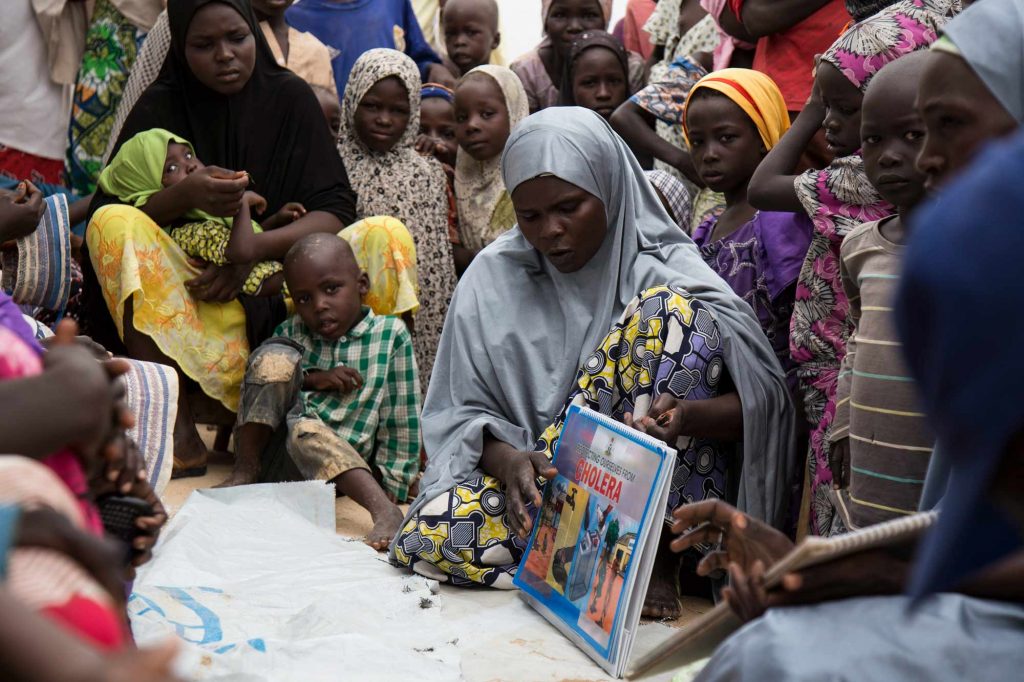
Sanitation
Water, Sanitation & Hygiene
Despite the wider recognition of sanitation as a human right and the achievement of significant progress toward the Strategic Development Goal (SDGs) of halving the number of people in the world who lack access to improved sanitation facilities, providing proper sanitation remains a significant global challenge.
Despite the progress achieved, an estimated 2.4 billion people still use unimproved sanitation facilities, with nearly 1 billion of these practicing open defecation. In the rural areas of many African and Asian nations, the rates of those practicing open defecation run at around 50%. Without adequate sanitation communities are highly vulnerable to diarrhea and other diseases and risk contaminating their drinking water. Half of all hospital beds in developing countries are occupied by people with water and sanitation-related diseases, including diarrhea, pneumonia, eye and skin infections, malaria, cholera and typhoid. International Medical Corps provides sanitation facilities during emergencies to retain the further outbreak of disease and works with communities to build sustainable, safe and adequate sanitation.
Our Response
International Medical Corps considers improvement of sanitation infrastructure and services as essential components of our comprehensive approach to health care. Adhering to our philosophy of working closely with those most affected by disasters, we actively engage communities and relevant authorities in the development and implementation of sustainable WASH programs. Moreover, we support communities as they promote sanitation in early recovery or development phases through a mix of community centered approaches.
Among the many examples of our work:
ETHIOPIA, implementing a pilot project.
International Medical Corps is implementing a pilot sanitation marketing program in four kebeles in the Bolososore and Damotpullasa districts of Wolayta Zone in the ethnic-based regional state of Southern Nations, Nationalities and People’s Region–SNNPR. The program has the goal of creating a private sector for sanitation product suppliers and at the same time increase community-level demand for those products. The effort is linked with the area’s existing Community-led Total Sanitation (CLTS) initiatives, whose goal is to end open defecation. The initiatives include a credit and saving association where local residents can save for items such as a washable concrete toilet slab to replace simple earthen latrines that often collapse in heavy rains, leading to unhygienic spillage of human waste that can easily lead to disease. The pilot program is supported by donors including ECHO, International Medical Corps and Earth Council.
ZIMBABWE, improving sanitation.
During a year-long $1 million grant from the USAID’s Office of Foreign Disaster Assistance (OFDA) that ended in the summer of 2017, International Medical Corps implemented a program that focused in part on improving sanitation methods, as well as practicing proper hygiene techniques such as handwashing, as ways to reduce the contaminated water and unsanitary conditions where malnutrition-causing diseases such as diarrhea, cholera and typhoid can thrive.
Working at the community level, our teams have established more than 300 village health clubs to create greater awareness about the need to improve sanitation and to eliminate open defecation. In a typical story, a 37-year-old mother of four who attended an International Medical Corps training session about the risks of open defecation, returned home to explain those dangers to a group of villagers who had gathered to listen. They agreed to establish a health club and now, numbering 25, they disseminate messages on practices that lead to improved health.
AFGHANISTAN, encouraging behavior change.
In a country where only just over one quarter of the population have access to improved sanitation facilities, we operate a Community Led Total Sanitation (CLTS) program with the goal to end open defecation. We do this by focusing on behavior change. Our WASH teams work closely with communities to educate them on the risks of open defecation and then enable them to spread these messages and information among their peers. We encourage the formation of Family Health Action Groups, which work with Community Health Workers to foster behavior change around sanitation and hygiene at the household level.
NORTHEASTERN NIGERIA, improving conditions in former Boko Haram-held areas.
International Medical Corps is working in six local government areas (LGAs) in Borno State—the epicenter of the humanitarian crisis triggered by the ongoing conflict with Boko Haram—to improve access to safe drinking water, sanitation, and hygiene for nearly 300,000 people. We work in displacement camps and communities hosting a large number of internally displaced persons (IDPs) to improve overall sanitation and hygiene in communities. We construct and manage latrines, provide garbage cans, and create drainage systems. This infrastructure is supported by teams of community volunteers who educate families on the importance of personal hygiene in health and how to prevent potentially deadly waterborne diseases, like cholera. We are also working to improve WASH infrastructure in four health facilities in Borno State, including supporting waste management (i.e. building incinerators), installing hand-washing stations, providing latrines and showers, and training health facility staff in medical waste management.
We distributed 57,014 hygiene kits in 2016
Only 27% of all Afghans have access to sanitation facilities
More than 2,600 individuals received training as part of our WASH programs in 2016